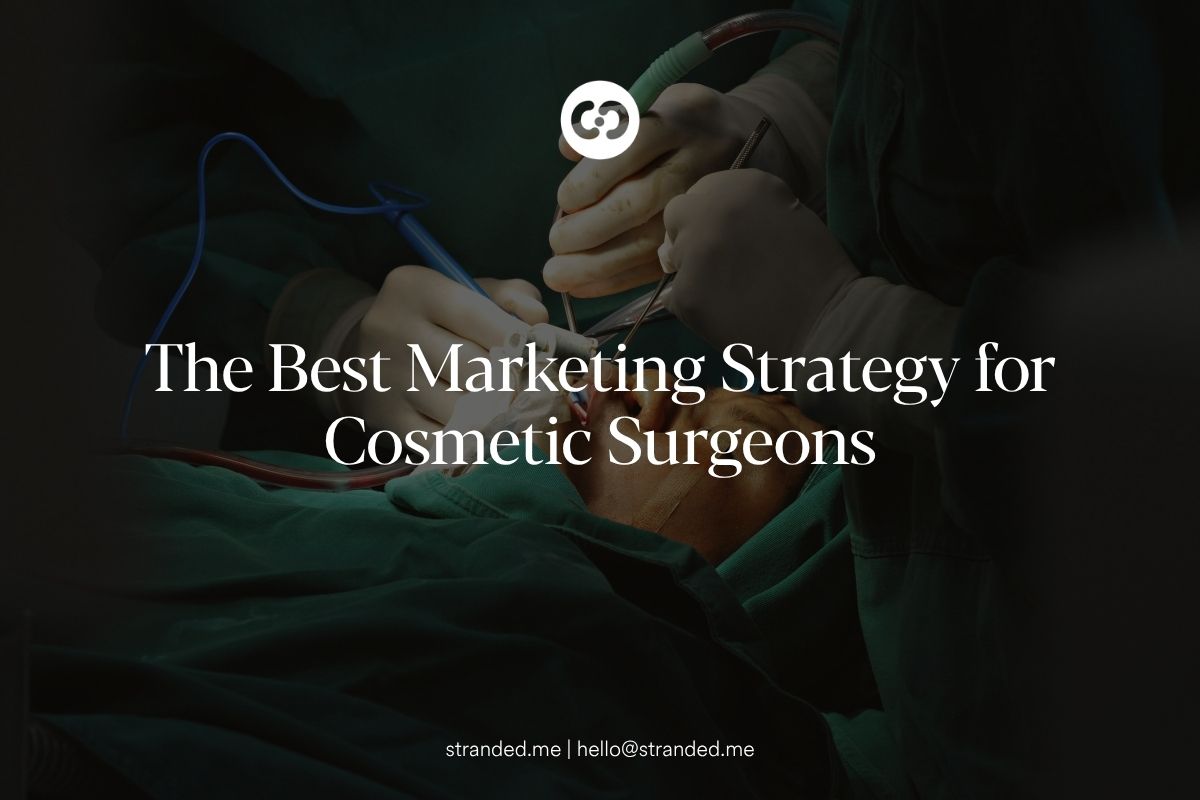The Best Marketing Strategy for Cosmetic Surgeons
Min Read

© Stranded
Successful cosmetic surgery marketing doesn’t rely on quick fixes. It thrives on connection, credibility, and consistency. The best marketing strategy for cosmetic surgeons unites SEO, paid ads, content, and patient experience into a single growth system that builds trust long before a consultation is booked.
Below, we break down a holistic approach that helps cosmetic surgeons increase visibility, attract high-value patients, and scale efficiently—without wasting budget or sacrificing authenticity.
1. Understand the Cosmetic Patient Journey
Patients don’t book cosmetic procedures impulsively. Their decision-making process moves through several stages: awareness, consideration, decision, and advocacy. A strong strategy addresses each step with tailored messaging.
- Awareness: Build visibility with SEO and paid search.
- Consideration: Use educational videos, blog posts, and testimonials.
- Decision: Provide transparent pricing, doctor credentials, and reviews.
- Advocacy: Encourage satisfied patients to leave reviews and referrals.
2. Strengthen Your Brand Foundation
Your brand is the perception patients form before ever contacting your office. Ensure consistency across your website, ads, and social channels. High-quality imagery, refined messaging, and a patient-first tone build authority and trust.
Ask yourself:
- Does our website reflect the level of care we deliver?
- Is our value proposition clear within the first few seconds?
- Are our visuals cohesive across all platforms?
3. Leverage SEO for Long-Term Visibility
SEO is the backbone of cosmetic surgery marketing. When done right, it positions your practice in front of patients actively searching for your services. Focus on:
- Procedure pages optimized for “service + city” keywords
- Medical schema markup and FAQ sections for Google visibility
- Blog posts that answer real patient questions (“What is the downtime after a facelift?”)
Related resource: SEO Services
4. Use Google Ads to Capture High-Intent Leads
Google Ads reach people who are ready to book. Target keywords like “best cosmetic surgeon near me” or “rhinoplasty consultation in [City].” Combine precise targeting with high-converting landing pages that include testimonials and clear CTAs.
- Separate campaigns by procedure (facelift, liposuction, breast augmentation)
- Use ad extensions for calls, locations, and reviews
- Track every conversion—calls, forms, and appointments
Related resource: PPC Services
5. Showcase Authenticity on Social Media
Social media is your trust accelerator. Focus on authenticity over perfection—patients want to see your process, results, and care. Post educational clips, before-and-after reels, and Q&A videos to position yourself as both approachable and authoritative.
- Highlight transformations with context and consent
- Feature behind-the-scenes moments from consultations or recovery
- Respond to comments and DMs promptly to build community
6. Optimize for Conversions, Not Clicks
Every marketing channel should guide visitors toward booking. Simplify navigation, reduce form fields, and ensure your “Book a Consultation” button is visible on every device. Small improvements can double your conversion rate.
7. Build Reputation Through Reviews and PR
Reputation drives both patient trust and SEO performance. Encourage happy patients to share reviews and leverage earned media placements to validate your authority.
- Request reviews via email or SMS post-procedure
- Feature “As Seen In” logos or publications
- Publish expert commentary on trends or patient safety topics
8. Measure, Refine, Repeat
Track what matters: cost per lead, consultation-to-surgery ratio, and lifetime value. Use this data to refine your campaigns monthly. Growth isn’t about doing more—it’s about doing better.
9. Combine Data With Human Touch
Numbers drive optimization, but empathy drives loyalty. Train your team to follow up promptly and handle inquiries with care. Patients remember how your team made them feel more than any ad they saw.
10. Partner With a Specialized Marketing Agency
Working with an agency that understands the aesthetics industry saves time and budget. At Stranded Media, we help cosmetic surgeons align their brand, ads, and content with data-driven systems that build lasting trust and measurable growth.
Conclusion
The best marketing strategy for cosmetic surgeons is holistic—not transactional. When you combine visibility (SEO + PPC), trust (social proof + PR), and consistency (branding + follow-up), you create a patient journey that converts curiosity into loyalty.
Frequently Asked Questions
What is the best marketing strategy for cosmetic surgeons?
A balanced approach that integrates SEO, Google Ads, social media, and patient experience. Each channel supports a different part of the patient journey and works best when aligned.
Do Google Ads work for cosmetic surgery?
Yes. Google Ads can drive immediate patient inquiries when campaigns target high-intent searches and direct visitors to optimized procedure-specific landing pages.
How can I get more cosmetic surgery leads online?
Focus on SEO for long-term growth, paid ads for instant visibility, and reviews for trust. Combine them with fast follow-up systems to convert inquiries into consultations.
How do I measure ROI from cosmetic surgery marketing?
Track cost per lead, consultation booking rates, and revenue per patient. These metrics show which channels drive real results so you can reinvest strategically.
Book a Free Strategy Call
We’ll review your current marketing, talk through your goals, and outline a custom strategy. No pressure, just honest insight.

